House Extension Cost
Last updated 10th April, 2025
Are you thinking about extending your home but not sure about the costs?
This guide covers all you need to know about a house extension. You can find out about materials, labour and the different types of house extensions together with the costs involved in getting the job done.
The average cost of a single-storey house extension is around £47,000 in 2025.
If you need more living space and don’t want to move home, then a house extension might just be the solution. An extension can add value to your property and provide extra room for a growing family or an elderly parent.
Let’s get started!
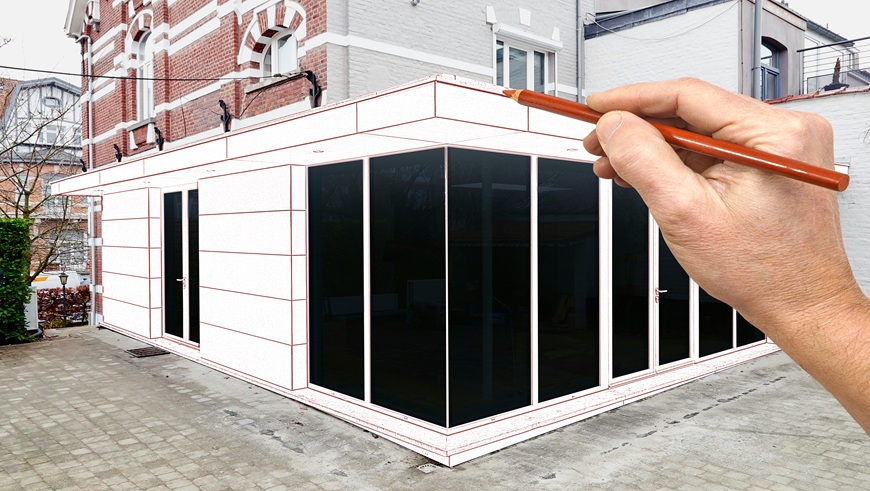
How Much Does a House Extension Cost?
The average cost of building an extension covers a wide range as the cost depends on the type of extension and the size.
We’ll cover each type in this guide. Average costs, however, start at around £30,000, but if you have a 2-storey high-quality extension, you could be looking at between £87,000 and £114,000.
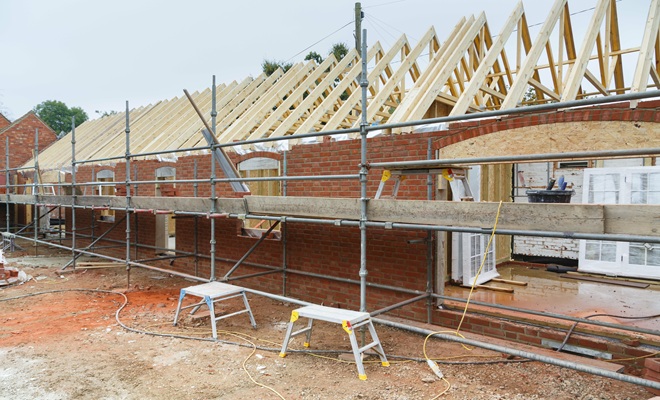
We’ve gathered a variety of quotes from building companies throughout the UK to give you ballpark figures for a house extension build. Your budget needs to include the costs of the planning, design, structure, plumbing and electricity.
When you are looking for quotes, make sure you get at least 3 for each job so that you can compare their experience, skills and pricing.
House Extension Prices
| Type Of Extension | Average Cost |
|---|---|
| Rear (Single Stoey) Rear (Double Storey) |
£47,500 £85,000 |
| Side Return (Single Storey) Side Return (Double Storey) |
£37,500 £43,750 |
| Wraparound (Single Storey) Wraparound (Double Storey) |
£55,000 £70,000 |
| Over structure (Garage) Single Over structure (Garage) Double |
£27,000 £54,000 |
| Conservatory | £9,500 |
| Orangery | £25,925 |
| Loft | £20,000 - £50,000 |
| Basement (Existing) Basement (New) |
£1,000 per square metre £3,000 per square metre |
Table of Contents
Many of the builder’s quotes you receive will provide a price per square metre. The cheapest extension will be a basic single-storey side extension, which can cost between £1,000 per square metre and around £1,500 per square metre.
A two-storey extension will cost, on average, between £1,200 and £1,800 per square metre. Have a look at the charts below to find out the average cost of each type of extension according to size and finish.
A basic price covers the essentials. A mid-range price will be a mix of essentials and mid-range quality fixtures like flooring. A high-quality finish means all fixtures and fittings are top quality and cost more than average.
The size and type of extension will also influence the price. A side return extension is often smaller than a rear extension because of the availability of space. A conservatory will cost less than a rear or side extension because they take less time to build, and they are often prefabricated.
The types of extension we have priced in this guide include:
- Rear
- Side Return
- Wraparound
- Over structure (Garage)
- Conservatory
- Orangery
- Loft
- Basement
Single-storey Extensions
| Type | Size | Finish | Cost Per m2 | Total Cost |
|---|---|---|---|---|
| Rear | 15m2 25m2 50m2 |
Basic | £1,700 | £25,500 £42,500 £85,000 |
| Rear | 15m2 25m2 50m2 |
Midrange | £1,900 | £28,500 £47,500 £95,000 |
| Rear | 15m2 25m2 50m2 |
High-Quality | £2,200 | £33,000 £55,000 £110,000 |
| Side Return | 20m2 25m2 35m2 |
Basic | £1,375 | £27,500 £34,375 £48,125 |
| Side Return | 20m2 25m2 35m2 |
Mid-Range | £1,500 | £30,000 £37,500 £52,500 |
| Side Return | 20m2 25m2 35m2 |
High Quality | £1,800 | £36,000 £45,000 £63,000 |
Wraparound and Over Structure Extension
| Type | Size | Finish Type | Cost Per m2 | Total Cost |
|---|---|---|---|---|
| Wraparound Single Storey | 15m2 25m2 35m2 |
Basic | £1,900 | £28,500 £47,500 £66,500 |
| Wraparound Single Storey | 15m2 25m2 35m2 |
Midrange | £2,200 | £33,000 £55,000 £110,000 |
| Wraparound Single Storey | 15m2 25m2 35m2 |
High-Quality | £2,400 | £36,000 £60,000 £120,000 |
If you have a garage, then you could consider an extension over the garage space. You can choose to have a single or double-storey extension. An over structure extension is ideal if you don’t have a lot of room to expand. You can create a room over a garage or on top of a single-storey extension you already have.
| Type of Extension | Finish Type | Average Total Cost |
|---|---|---|
| Over structure (Single Garage) | Basic Mid-Range High-Quality |
£20,000 £27,000 £35,000 |
| Over structure (Double Garage) | Basic Mid-Range High-Quality |
£37,000 £54,000 £72,500 |
Building a two-storey extension will give you even more space. The costs will be higher, but they won’t be double the cost of a single storey because you already have the costs of the roof and the structure.
Double-Storey Extensions
| Type | Size | Finish | Cost Per m2 | Total Cost |
|---|---|---|---|---|
| Rear | 30m2 50m2 100m2 |
Basic | £1,500 | £45,000 £75,000 £150,000 |
| Rear | 30m2 50m2 100m2 |
Midrange | £1,700 | £51,000 £85,000 £170,000 |
| Rear | 30m2 50m2 100m2 |
High-Quality | £2,000 | £60,000 £100,000 £200,000 |
| Side Return | 40m2 50m2 70m2 |
Basic | £1,500 | £60,000 £75,000 £105,000 |
| Side Return | 40m2 50m2 70m2 |
Mid-Range | £1,700 | £68,000 £85,000 £119,000 |
| Side Return | 40m2 50m2 70m2 |
High Quality | £2,250 | £90,000 £112,500 £157,500 |
There are also other types of extensions to consider. Wraparound extensions combine a side return and rear extension for even more space.
Double Wraparound
| Type | Size | Finish | Cost Per m2 | Total Cost |
|---|---|---|---|---|
| Wraparound Double Storey | 30m2 60m2 100m2 |
Basic | £1,333 | £40,000 £65,000 £90,000 |
| Wraparound Double Storey | 30m2 50m2 100m2 |
Midrange | £1,566 | £47,000 £70,000 £95,000 |
| Wraparound Double Storey | 30m2 50m2 100m2 |
High-Quality | £1,833 | £55,000 £75,000 £100,000 |
An orangery or conservatory is also a way to create extra space by using your garden. Both structures are created mainly from glass, which increases natural light and brings the outside in.
Conservatory
| Extension Type | Size | Average Cost |
|---|---|---|
| Conservatory | 3500mm x 2000mm | £8,000 |
| Conservatory | 3500mm x 2500mm | £9,000 |
| Conservatory | 4000mm x 2000mm | £9,500 |
Orangery Extension
| Type | Size | Finish | Cost Per m2 | Total Cost |
|---|---|---|---|---|
| Orangery | 15m2 25m2 40m2 |
Basic | £734 £880 £912 |
£11,000 £22,000 £36,480 |
| Orangery | 15m2 25m2 40m2 |
Midrange | £900 £1,037 £1,312 |
£13,500 £25,925 £52,480 |
| Orangery | 15m2 25m2 40m2 |
High-Quality | £1,165 £1,312 £1,400 |
£17,475 £32,800 £56,000 |
You can also make use of your loft or basement to extend your home. Loft conversions are often built to create an extra bedroom and bathroom. The cost of a loft extension will depend on the type of loft you choose. Choices include Mansard, Dormer, Velux and Gable.
The most cost-effective type of loft conversion is Velux conversion. The most expensive loft conversion is a Mansard loft conversion, which adds a new storey to your building.
Basement conversions are much more expensive, but you can create a whole new living area from the space. A basement extension can be turned into a new kitchen, a guest bedroom, a home entertainment area, a home spa and more.
Here are some average house extension costs for a loft or basement.
Loft and Basement Extension
| Extension | Size | Type | Total Cost |
|---|---|---|---|
| Loft Extension | 30 sqm | Velux Gable Dormer Mansard |
£15,000 £28,000 £25,000 £37,500 |
| Loft Extension | 40 sqm | Velux Gable Dormer Mansard |
£20,000 £38,000 £32,500 £50,000 |
| Loft Extension | 50 sqm | Velux Gable Dormer Mansard |
£24,000 £47,500 £40,000 £62,500 |
Basement Extensions
| Type | Conversion | Cost Per Square Metre |
|---|---|---|
| Basement Extension | Existing Basement | £1,000 - £1,800 |
| Basement Extension | New Basement | £2,000 - £3,000 |
All the prices of each type of extension are average costs. If you live in London or the southeast of England, you may pay more because the average cost of products and services in these locations is usually higher than the UK average.
Materials Used
Another factor that will affect the cost of a home extension is the type of materials used in the construction. The most common type of material is brick and block. Conservatories and orangeries typically use glass and brick. An alternative to brick and block is a timber frame.
Most timber frame extensions are made of pine, maple or oak. Pine will cost around £1,600 per square metre. Maple timber is priced at around £1,800 per square metre. The most expensive timber is oak. You can expect to pay around £2,100 per square metre for white or red oak.
Additional Costs
Along with the cost of building the extension, there are often additional costs you’ll need to consider.
Architects and Structural Engineer’s fees – An architect will design your new extension and draw up the plans ready for the builder. A structural engineer will make sure the new structure is safe by looking at the type of building material you’re using, the location of the extension, the structural support required and the weight of the build.
The average cost of an architect is around 10% of the build cost. For example, if your new extension has a building cost of £55,000, then the fees for the architect would be around £5,500.
A structural engineer will usually charge a day rate of around £450. Building an extension could mean you need a structural engineer for between 1 and 4 days, so you should budget for between £450 and £1,800.
Planning Permission – The Mid-Range news is that most home extensions don’t need planning permission as long as you follow the rules and regulations of permitted development rights.
However, if you are planning to build a two-storey extension at the side or front of your property, you will need to apply to your local planning department. The costs of planning permission are £206 in England and £202 in Wales.
Building Regulations
You will have to comply with building regulations when you have a house extension built. Fees depend on your local authority, but on average, for plans, a building notice and an inspection will cost between £1030 and £1750.
Groundwork and Foundations
Before the builder can start on the structure of your extension, they will need to prepare the ground and lay the foundations. This may be an extra cost. The average price to prepare and lay foundations for the average kitchen extension will cost around £2,000.
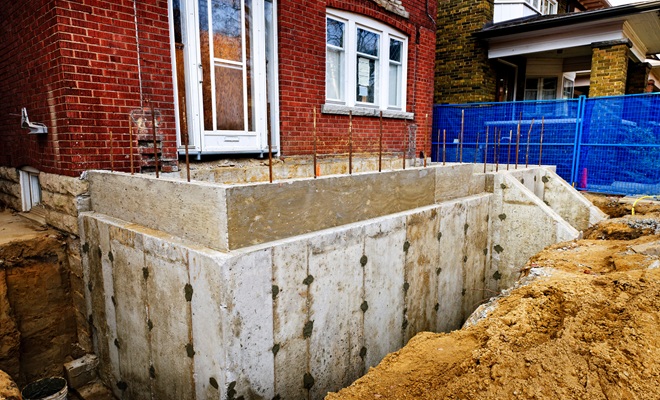
Utilities and Drainage
If your extension needs to have heating and water, then you will need to install these utilities along with drainage.
It might be necessary to update all of the wiring in your home in order to meet building regulations. An average home rewire costs around £4,000, but this price does depend on the size and the location of your home. If you need to install a new consumer unit, then you can expect to pay around £500.
Building your extension might also mean you have to move a drain to a new location. Costs depend on the distance the drain needs to be moved and the type of drain. You can expect to pay, on average, between £4,000 and £6,000 for materials and labour. Plumbers charge between £40 and £60 an hour or a day rate of between £320 and £480.
Interior Finishing
Plastering, painting, decorating, and lighting are also costs that need to be added to your budget. The price you pay for fixtures and fittings will depend on whether you want a basic, mid-range or high-quality finish.
These are some of the costs you may have once your extension is built:
| Material Type | Price Ranges | Average Cost |
|---|---|---|
| Flooring | £7 - £70 Per m2 | £112 - £1,120 for 16m2 |
| Radiators | £100 - £300 Each | £200 - £300 |
| Windows | £375 - £450 Each | £2,250 4 Casement Windows |
| Doors | £25 - £500 Each | £350 Oak Internal Door |
| Kitchen Units | £75 - £400 Each | £400 Double Solid Wood Unit |
| Worktops | £110 - £1,000 (2m x 960mm x 40mm) | £250 Solid Wood £110 Laminate £1,000 Corian |
| 6 Kitchen Appliances | £600 - £9,000 | £350 for each appliance |
| Bathroom Suite Inc. Shower | £2,000 - £10,000 plus | £4,500 - £7,000 Mid-Range Fittings |
| Tiling | £13 - £60 per m2 | £20 per m2 Ceramic |
| Lighting | £23 - £300 | £150 Kitchen Ceiling |
The costs depend on the materials you choose. The cheapest flooring option, for example, is vinyl, which is between £7 and £20 per square metre. A wood floor, on the other hand, can cost between £17 and £70 per square metre.
Windows and doors depend on whether you choose to have uPVC, which costs between £250 and £900 depending on the size, or wooden windows, which can cost anything between £800 and £2,000 each.
The trades you may use in a building project include:
You may be using different trades, including:
- Builder
- Painter and Decorator
- Electrician
- Carpenter
- Tiler
- Roofers
- Plumbers
- Plasterers
- Joiners
Here are the average costs of the tradespeople you might need to use:
| Tradesperson | Hourly Rate | Day Rate |
|---|---|---|
| Builder | £20 - £35 | £160 - £280 |
| Painter and Decorator | £12 - £20 | £96 - £160 |
| Electrician | £30 - £50 | £240 - £400 |
| Carpenter | £30 - £40. | £240 - £320 |
| Tiler | £20 - £40 | £160 - £320 |
| Roofers | £30 - £40 | £240 - £320 |
| Plumbers | £40 - £60 | £280 - £480 |
| Plasterer | £30 - £50 | £240 - £400 |
| Joiners | £35 - £45 | £280 - £360 |
Party Wall Agreements
If you and your neighbour share a wall, and that wall will be subject to building work, then you will need to have a Party Wall Agreement. This will mean using a surveyor.
The average cost for a typical party wall agreement is around £1,000, as long as it isn’t a complex issue. Basement conversions often involve neighbours on either side of your home, and in this case, you will need two surveyors because basement projects are usually complex. You could pay as much as £6,000 to get the party wall agreements.
VAT on Materials and Labour
If you use a VAT-registered builder, then they will charge the standard VAT rate of 20% for a home extension. This means if you have a quote of £40,000 for a build, the total will be 20% more once VAT is added. Your final total will be £48,000 (£40,000 plus £8,000 for VAT).
Permitted Development Rights
If you want to build an extension which is larger than the measurements under permitted development, you will need to follow the notification and prior approval process. The application can be made online at the Planning Portal. It will be necessary to include the fee for the process, which is currently (2025) £120.
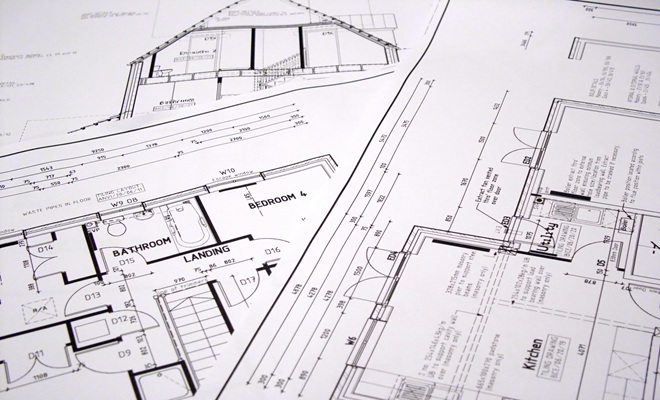
If the build is approved, you won’t need to apply for planning permission, and you’ll save on the application costs. Consultation costs at your local council are around £50 to £150, and a planning permission application will cost £206.
Cost Breakdown Calculator
Individual cost of a Single-storey average extension of 25m2 with a Mid-Range finish. Total cost: £37,500
Materials
£18750
Labour
£15000
Planning
£3750
Labour Costs and Timeframes
Labour costs and timeframes depend on the type of extension you are having built. The amount of time it takes to plan and build an extension will also depend on whether or not there are any hold-ups in design and planning. Access restrictions might also cause delays, and building work might come to a halt if the weather is bad.
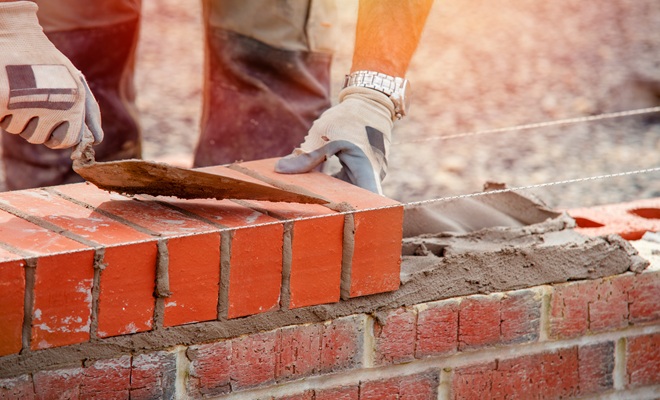
The following will give you a rough idea of the labour costs and timescales.
| Types | Labour Costs | Timeframe |
|---|---|---|
| Rear Single Storey | £19,000 | 11 - 13 weeks |
| Rear Double Storey | £34,000 | 15 – 18 weeks |
| Wraparound Single Storey | £22,000 | 10 – 14 weeks |
| Wraparound Double-Storey | £28,000 | 17 - 19 weeks |
| Side Return Single Storey | £15,000 | 9 - 12 Weeks |
| Side Return Double Storey | £34,000 | 12 - 16 weeks |
| Over structure (Single Garage) | £10,800 | 8 - 12 weeks |
| Over structure (Double Garage) | £25,600 | 8 - 12 weeks |
| Conservatory | £3,600 | 2 - 4 weeks |
| Orangery | £11,000 | 2 – 6 weeks |
| Loft | £15,200 | 13 – 18 weeks |
| Basement | £600 per square metre | 3 – 5 months |
House Extension Type
Here are some different types of house extension:
Single Storey Extension Costs
The most common type of extension is a single-storey extension. They are normally used to create a new kitchen or living area. The average cost of a medium-sized single-storey structure with mid-range fittings is between £47,500 and £55,000.

Pros
- ✔ Less time to construct than a loft or basement extension
- ✔ Adds value to your home
Cons
- ✖ Might reduce natural light to other interior rooms
- ✖ You’re usually only adding to one room, which may not be enough space
Double Storey Extension Costs
The advantage of a double-storey extension is, of course, that you gain more space and have the opportunity to create living space downstairs and an extra bedroom, home office, or teenage den upstairs. Expect to pay between £43,750 and £85,000 to build a double-storey extension.

Pros
- ✔ Double the amount of room
- ✔ Adds more value to your property than a single-storey extension
Cons
- ✖ More time is needed for the build
- ✖ More costs involved
Side Return Extension Costs
A side return extension can utilise the space you have at the side of your home. They are often used as kitchen extensions. You can have a double-storey, which could create space above for a new bathroom.
The average cost for a single-storey side return extension is around £37,500. The average cost for a double-storey will be £43,750.

Pros
- ✔ Can utilise the space at the side of your property that isn’t usually used efficiently
- ✔ No need to lose any space in your back garden
Cons
- ✖ Not suitable for wide extensions
- ✖ Access may be difficult during the build, which could result in extra costs
Wraparound Extension Costs
Wraparound extensions use the side and rear of your home. The average cost for a single-storey wraparound extension is around £55,000. A double-storey wraparound extension will cost in the region of £70,000.
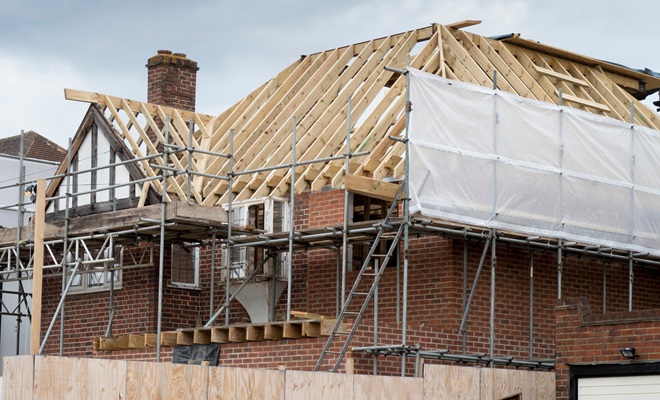
Pros
- ✔ Provides a larger amount of living space
- ✔ Creates a space that blends your indoor living space with the outdoors
Cons
- ✖ May need a party wall agreement
- ✖ Often needs additional structural work
Timber Frame Extension Costs
Timber frame extensions are popular with householders who want to create a natural, warm look. Common materials are pine, maple and oak. The average cost for a timber-framed single extension of 15m2 is around £24,000. A double-storey extension of the same size in pine will cost around £40,000.

Pros
- ✔ Less time to build than a brick extension
- ✔ Environmentally friendly
Cons
- ✖ Must be maintained to prevent rotting or insect damage
- ✖ Sound insulation isn’t as good as brick
Prefab Extension Costs
A prefab extension is an affordable way to create extra space without the disruption and cost of a standard home extension. They are either delivered ready-made or as a kit that you will need to assemble. The cost of a 25m2 single-storey flat pack extension is between £25,000 and £30,000.
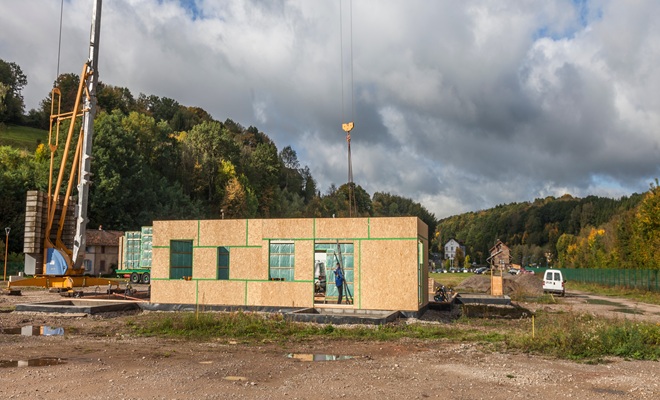
Pros
- ✔ Costs less than a standard extension
- ✔ Less disruption and mess
Cons
- ✖ Less design flexibility
- ✖ May be difficult to source
Bungalow Extension Costs
If you love your bungalow and don’t want to move, a bungalow extension is the perfect way to create more space. The cost of a typical single-storey rear extension will be between £20,000 and £25,000 for 15 sqm. If you want even more space, you can have a dormer built, which will cost, on average, between £30,000 and £45,000 for 40 sqm.
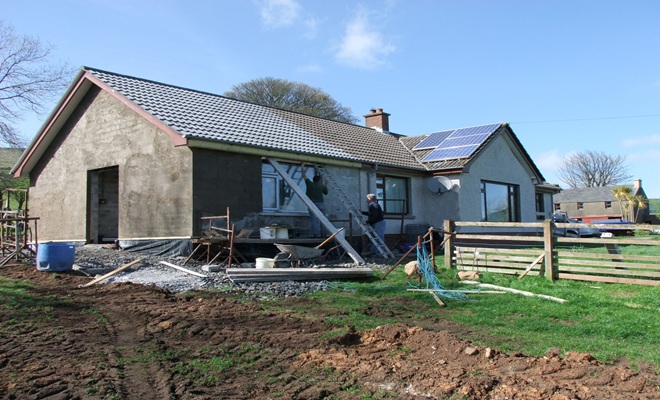
Pros
- ✔ Adds value to your home
- ✔ Most bungalows have large gardens to accommodate side and rear extensions easily
Cons
- ✖ May need extra building work to strengthen the structure
- ✖ An expensive extension may exceed your property’s market value
Rear Extension Costs
A rear extension normally expands the living area or creates space for a new kitchen. The average cost of a rear extension is between £25,000 and £40,000. A double-storey extension at the rear will cost, on average, between £40,000 and £50,000.
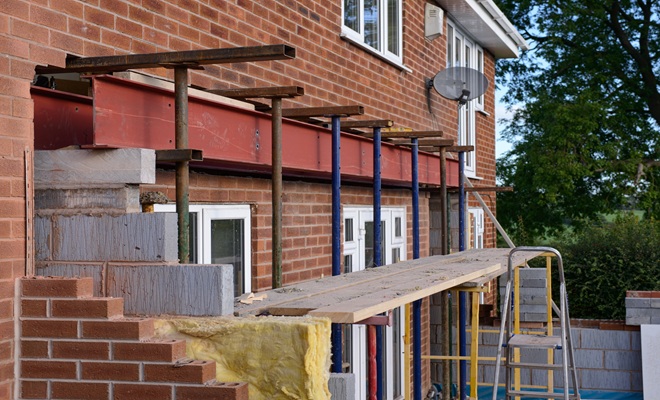
Pros
- ✔ Creates extra space from the garden
- ✔ Adds value to your home
Cons
- ✖ The size of the garden may limit the size of a new room
- ✖ You will lose garden space
Over Structure Extension (Garage) Costs
If you don’t have space at the side and you don’t want to lose part of your garden, then a solution would be to build an extension over an existing garage. The cost to build a single garage extension is around £27,000. A double garage extension will be around £64,000.
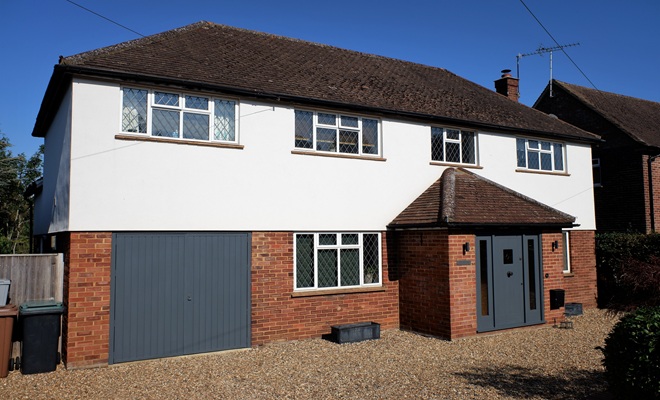
Pros
- ✔ Cheaper to construct than most other types of extension
- ✔ No loss of garden space
Cons
- ✖ Garage extensions are likely to have a flat roof, which may have drainage issues
- ✖ You won’t have ground floor space
Conservatory Extension Costs
A conservatory usually has walls up to a metre in height and then glass panes the size of large windows. The roof can be solid, glass or a mixture of both.
A conservatory costs around £9,500 to install.
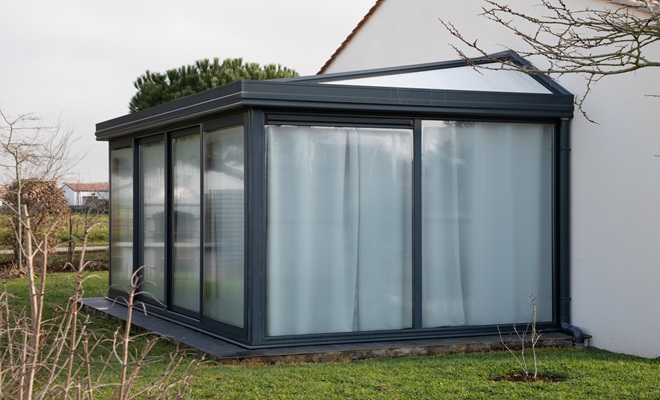
Pros
- ✔ A cheaper alternative to a standard home extension
- ✔ Doesn’t take long to build
Cons
- ✖ Doesn’t add as much value to your home as a standard extension
- ✖ May be difficult to heat and cool
Orangery Costs
Orangeries are typically a mix of glass and brickwork with a flat roof, They often have a glass lantern window which extends upwards from the flat roof.
An orangery, on average, will cost £27,000.
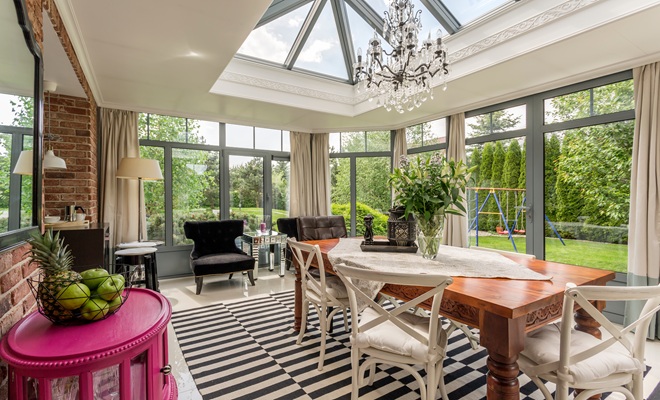
Pros
- ✔ Stays at a consistent temperature
- ✔ Adds more value than a conservatory
Cons
- ✖ More expensive to build than a conservatory
- ✖ Flat roofs usually require more maintenance
Loft Extension Costs
A loft extension is a great way to gain more living space. Basic loft extensions are an affordable option and will cost, on average, around £20,000, but you can also opt for a luxury conversion and spend £50,000 or more.
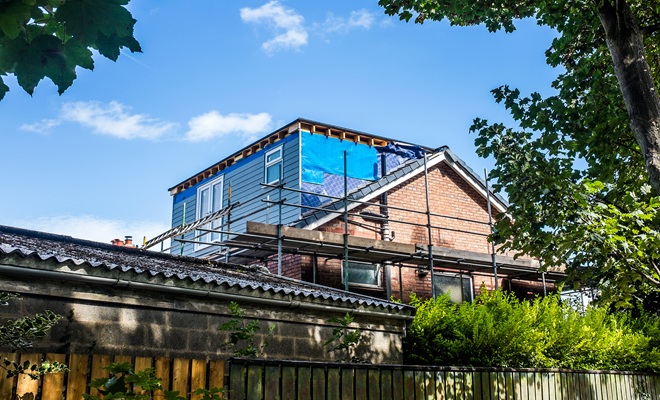
Pros
- ✔ Doesn’t take up garden space
- ✔ Cheaper than a standard extension
Cons
- ✖ You lose storage space
- ✖ Sloping Ceilings may make adding furniture difficult
Basement Extension Costs
A basement extension is usually a substantial investment if you are excavating a new basement. But if you are using an existing basement or cellar, a competent DIY enthusiast should be able to do the job. Expect to pay between £1,000 and £3,000 per square metre for the conversion.
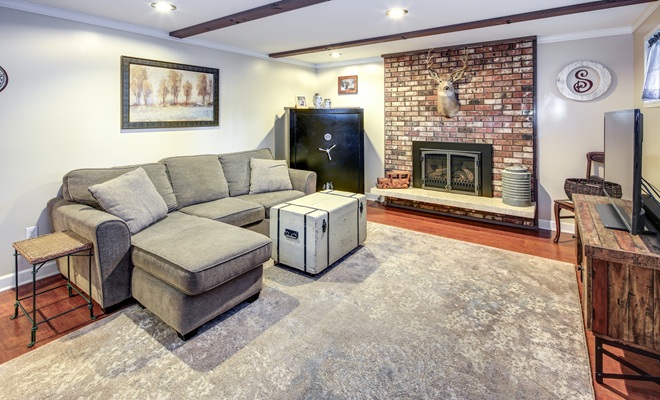
Pros
- ✔ No loss of external space
- ✔ Reduced external noise
Cons
- ✖ Building work can be very disruptive
- ✖ More expensive than other extensions
DIY Vs Professional Build
DIY Build
Building a house extension isn’t a job you should do as a DIY project. This is because you need to adhere to building regulations, and many aspects of the building work can only be undertaken by professionals, such as electrical and gas installation. Electrics will need to be carried out by a Part P-qualified electrician, and only a Gas Safe registered engineer can install gas appliances.
If you want to save money, then you can opt to do your tiling, decorating or flooring. You’ll need the time and the tools. The money you save will depend on the amount each tradesperson charges. For example, the hourly rate a decorator can charge is between £12 and £20, which means you’ll save around £96 to £160 a day.
Another way to save costs is to manage your own projects. A project manager generally oversees the building project by hiring contractors, dealing with building control, organising utilities and managing the finances. A typical project manager will charge between 15% and 25% of the total build cost, so if you have the time and the patience, it’s a way of saving. For example, 15% of a £200,000 rear extension will be £30,000, and 25% of £200,000 is £50,000.
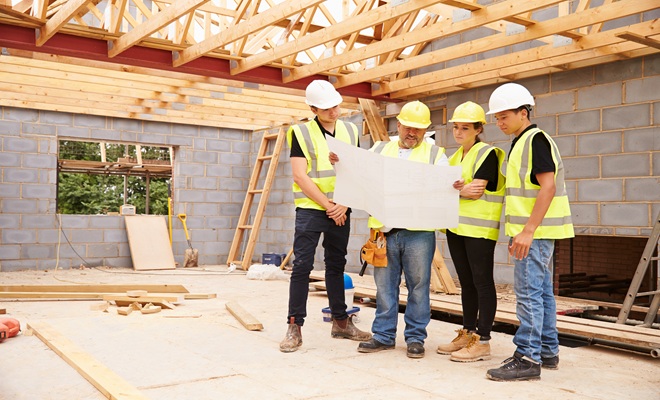
Professional Build
A professional build is likely to get the job done faster while meeting all the requirements of building regulations. If you use tradespeople who are part of the Competent Person Scheme, you will save yourself time and money by having the work certified by the tradesperson instead of paying for a building control inspection.
Planning Permission and Building Regulations
Most projects for a house extension don’t need planning permission as long as the following regulations are followed:
- ✔ A maximum height of 4m
- ✔ A side extension should be no more than half the width of your original property
- ✔ A single-storey extension on a detached property can extend up to 4m. On any other type of property, the distance is 3m
- ✔ You can only use up to half of your garden space
- ✔ The new extension needs to be built using similar materials to your current home
If you want to build an extension that goes beyond these limits, then you may need planning permission. Check out the planning rules on the Planning Portal website.
You can also visit your local planning department. Most councils offer a planning consultancy service, which costs between £50 and £150.
Planning rules may be different for householders living in listed buildings or in a conservation area, so consult your planning department before making any decisions.
You can apply for planning permission online. The cost is £206 in England and £202 in Wales. If you prefer to deal directly with your local council, you can also apply at the planning department.
Decisions about your application will normally take between 6 and 8 weeks. This is to give anyone who disagrees with your plans the opportunity to lodge an objection.
Building Regulations
Building regulations apply to every type of building extension. Not only that, but when the plans and inspections are made, you might be required to make changes to improve standards to your entire property, not just the extension. Typical changes are the installation of a fire door or the rewiring of the whole house.

The building regulations process costs between £50,00 and £100,00. You are responsible for making sure your home meets building regulation requirements. It is something you can do yourself or leave to the professional building your extension.
Some trades are registered with the Competent Person Scheme. This means that they are registered to self-certify their work and issue a compliance certificate without the need for an inspection from a building control inspector.
Cost of Removing or Altering an Existing Extension
The cost of an extension revamp can be between £24,000 and £54,000 depending on the extension size, the type of alterations and the money you spend on fixtures, fittings, plumbing and electrics.
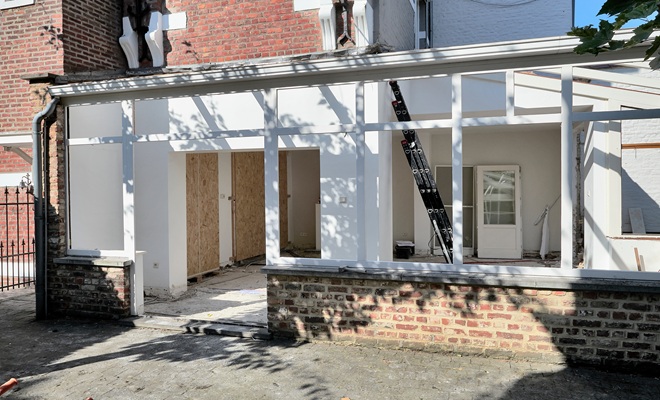
If you want to remove an extension, the cost will depend on the complexity of the job. The average cost to remove an existing single-storey extension is between £3,000 and £5,000. A double-storey extension could be around the £10,000 mark.
FAQs
You will need planning permission if:
- You want to build a two-storey extension at the front or side of your property.
- Your extension exceeds the limitations of the permitted development rights.
- You live in a listed building or a conservation area.
A structural engineer will offer help and advice on the safety and structure of your extension build. If you need to remove a load-bearing wall, for example, the structural engineer will tell you about the installation of steel beams such as RSJs.
The valuation of your home will depend on similar properties in your area. An extension doesn’t mean you can ask for more than the ceiling price for your area.
You can also add heating. For example, you can add radiators to the room as long as they meet building regulations. Underfloor heating is also an option. The cost of installing underfloor heating will depend on the size of the room, but on average, you can expect to pay between £40 and £80 per square metre for electric underfloor heating.
Finding and Hiring a Professional
Having an extension built can be a large investment. You want to make sure the professionals you use are experienced and reliable. You can find reliable builders by asking people you know for recommendations. Another way is to use an online directory like Price Your Job and My Job Quote.
Make sure you get at least 3 quotes from different builders with the same job details included in each quote so that they are easy to compare. Check what is included in each estimate, as this may differ. For example, one builder may include the cost of a skip to remove debris and building materials.
Ask each builder whether or not they are members of a trade association. You should use a builder who is a member of the Federation of Master Builders (FMB) because it demonstrates the builder’s credibility and commitment to high standards.
Some building works will require an inspection by a building control officer. If you don’t want to pay for a building control officer to inspect the work, then you should look for a tradesperson registered with the Competent Person Scheme if the type of work is covered by the scheme.
Also, check that they have Public Liability insurance and Employer’s liability to cover legal costs that could arise if property is damaged or someone is injured while the building work is being carried out.
Finally, ask each builder about their experience and whether they have references or recommendations from previous jobs. Find out too when the work will begin and how long it will take.
Insist that everything you discuss is put in writing, either on paper or by email.









